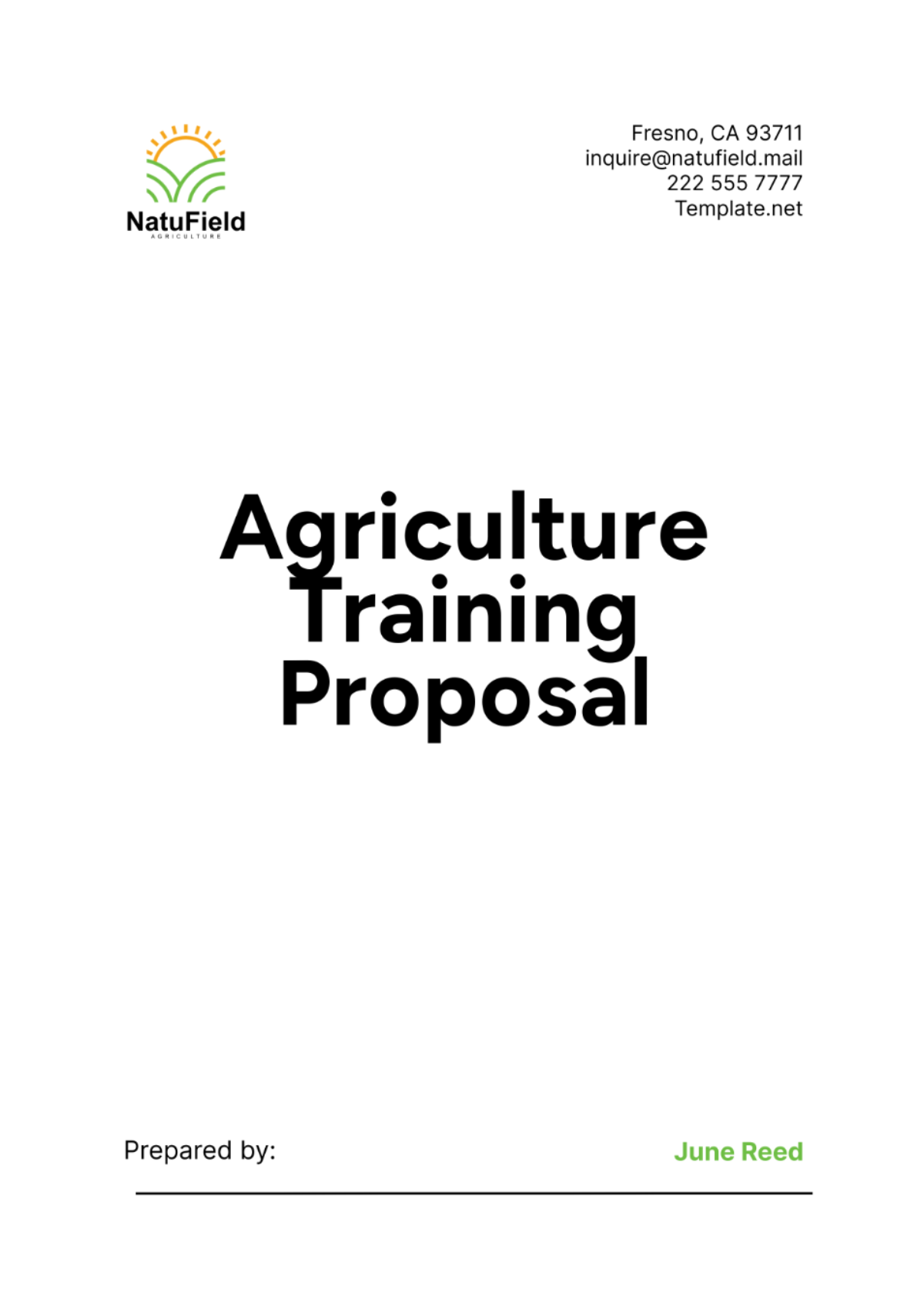Free Agriculture Training Proposal

I. Introduction
A. Overview of the Proposal
[Your Company Name]'s Agriculture Training Proposal seeks to address pressing agricultural challenges in [Country] by equipping farmers and agricultural stakeholders with essential skills and knowledge. The proposal aims to foster sustainable farming practices, enhance productivity, and improve resilience to climate change impacts through targeted training interventions. By empowering local farmers with practical expertise, the program aims to bolster food security and economic stability in rural communities.
B. Background of the Agricultural Sector
The agricultural sector in [Country] plays a pivotal role in the economy, yet faces significant challenges such as declining soil fertility, water scarcity, and fluctuating market prices. Smallholder farmers, comprising the majority of the sector, often lack access to modern agricultural techniques and face barriers in adopting sustainable practices. Addressing these challenges requires tailored training programs that integrate scientific knowledge with practical, locally applicable solutions.
C. Purpose and Goals of the Training Program
The primary purpose of this training program is to build capacity among farmers and extension workers to effectively manage agricultural resources, mitigate environmental risks, and improve livelihoods. Specific goals include promoting water-efficient farming methods, enhancing soil health through sustainable practices, and empowering farmers to adapt to changing climatic conditions. By fostering collaboration and knowledge exchange, the program aims to create a resilient agricultural community capable of sustainable growth and development.
II. Needs Assessment
A. Identification of Target Audience
The target audience comprises smallholder farmers, who typically manage modest-sized plots and rely heavily on their agricultural activities for their livelihoods; agricultural cooperatives, which are organizations formed by groups of farmers to achieve common goals such as improving market access, reducing costs, or enhancing bargaining power; and extension workers, who are professionals dedicated to providing technical assistance, training, and support to farmers to help them adopt new technologies and improve their agricultural practices.
The stakeholders were carefully identified due to their essential role in the agricultural value chain, covering all activities from production to distribution, and their urgent need for better technical knowledge and skills to improve their operations and efficiency, with this identification extending across multiple geographical regions to ensure a wide-reaching impact on the agricultural sector.
B. Analysis of Training Needs and Challenges
An in-depth needs assessment highlighted critical gaps in knowledge related to soil management, pest control, and water conservation techniques among farmers. Challenges such as limited access to quality inputs, inadequate post-harvest handling practices, and insufficient market linkages were also identified as barriers to agricultural development. Addressing these gaps is crucial for improving productivity and sustainability in the sector.
C. Stakeholder Consultation and Input
Consultations with local agricultural associations, government agencies, and community leaders underscored the urgency for targeted training initiatives. Stakeholders emphasized the importance of practical, hands-on training that integrates traditional knowledge with innovative approaches. Their input will guide the customization of training modules to meet local needs and ensure relevance and effectiveness.
III. Objectives
A. General Objectives of the Training Program
The ultimate aim of the program is to empower participants by providing them with the comprehensive knowledge and essential skills required to embrace and implement sustainable agricultural practices which, in turn, will enhance overall productivity. As participants progress through the program, they will gradually acquire the ability to apply climate-resilient farming techniques. By the time the program concludes, participants will be equipped not only to practice these advanced agricultural methods but also to play a significant role in promoting and supporting environmental conservation initiatives within their own communities, thereby contributing to broader ecological preservation efforts.
B. Specific Learning Outcomes
Participants will demonstrate proficiency in:
Implementing integrated pest management strategies tailored to local pest pressures.
Utilizing precision farming technologies to optimize resource use and minimize environmental impact.
Collaborating effectively within farmer cooperatives to strengthen market access and value chain integration.
C. Alignment with Agricultural Development Goals
The training program is in harmony with both national and regional strategies for agricultural development, which are designed to achieve several critical objectives: ensuring food security, alleviating poverty, and fostering sustainable development in rural areas. By equipping farmers with hands-on skills and imparting essential knowledge, the program contributes to and complements the larger initiatives aimed at increasing agricultural productivity. Additionally, it fortifies the resilience of the agricultural sector against the challenges posed by climate change, thereby supporting broader, long-term efforts to secure the livelihood of those dependent on farming.
IV. Training Design and Methodology
A. Training Approach
The training approach that we will adopt is designed to be highly participatory, placing a strong emphasis on experiential learning and the sharing of knowledge among peers. This methodology will encompass a variety of teaching methods to ensure comprehensive skill development and hands-on learning. Specifically, it will include traditional classroom sessions to cover theoretical aspects and provide foundational knowledge. In addition, there will be field demonstrations to illustrate real-world applications and to give participants the opportunity to observe and engage with practical examples.
Additionally, the training will include practical exercises, enabling participants to apply their knowledge in hands-on settings and reinforce their skills and comprehension. The program will also incorporate workshops and study tours aimed at fostering participant interaction, encouraging the exchange of ideas and experiences, and offering valuable networking opportunities while learning from established best practices in the field.
B. Curriculum Development
Core Modules
The core modules will cover essential topics such as:
Sustainable soil management techniques, including soil testing and nutrient management.
Water-efficient irrigation methods and drought-resistant crop varieties.
Integrated pest and disease management strategies using biological controls and pest scouting techniques.
Elective Topics
Participants can choose from elective modules such as:
Agroforestry and its role in biodiversity conservation and climate resilience.
Marketing strategies for agricultural products, including value addition and access to niche markets.
Gender-sensitive approaches to agricultural development, promoting inclusivity and equitable participation.
C. Instructional Strategies and Techniques
The training sessions are designed to be comprehensive and multifaceted, incorporating a variety of teaching methods to ensure a thorough understanding of the material. These sessions will include interactive lectures, during which participants will be encouraged to actively engage with the material through discussions and question-and-answer periods.
The training includes case studies, role-playing exercises, practical demonstrations, field visits, and hands-on exposure to modern agricultural practices, all designed to equip participants with essential skills.
V. Implementation Plan
A. Schedule and Timeline of Training Activities
The training program is set to last for a specified duration, and it will begin in the month of [Month] in the year [Year]. To facilitate the schedules of all participants as well as to ensure regular and meaningful engagement, training sessions will be held every two weeks. A comprehensive training calendar will be provided to all participants and relevant stakeholders. This calendar will include detailed information about the topics to be covered, the timings for each session, and the locations where each training module will take place.
B. Resource Requirements
Facilities and Equipment
Training venues will include equipped classrooms for theoretical sessions and demonstration farms for practical exercises. Essential equipment such as soil testing kits, irrigation tools, and safety gear will be provided to facilitate hands-on learning. Access to reliable internet and audiovisual aids will enhance the quality of educational materials and presentations.
Materials and Supplies
Training materials, including manuals, handouts, and reference books, will be tailored to each module's content and made accessible in digital and printed formats. Agricultural inputs like seeds, seedlings, and organic fertilizers will support field demonstrations and practical applications of learned techniques. Adequate provision of refreshments and meals will ensure participant comfort and sustained focus during sessions.
Personnel and Trainers
A team of qualified trainers, comprising agronomists, extension officers, and guest lecturers, will deliver specialized knowledge and mentorship throughout the program. Administrative staff will support logistical coordination, participant registration, and ensure smooth execution of training activities. Regular communication channels will be established to facilitate timely updates, feedback, and troubleshooting during the program.
C. Logistics and Coordination
A project management team will oversee all logistical arrangements, including venue bookings, transportation for field trips, and procurement of training materials. Regular meetings with stakeholders, including farmers' associations and local government bodies, will ensure alignment of training objectives with community needs and expectations. Continuous monitoring of participant attendance and engagement will inform adjustments to the implementation plan to maximize program effectiveness and participant satisfaction.
VI. Monitoring and Evaluation
A. Assessment Criteria and Indicators
Assessment criteria will include pre-and post-training evaluations to measure knowledge gain and skills development among participants. Indicators will also track the adoption rates of sustainable practices, changes in agricultural productivity, and improvements in participants' socio-economic conditions over time. Regular feedback from participants and stakeholders will be incorporated into ongoing assessments to gauge program impact and address emerging needs.
B. Methods for Monitoring Progress
Monitoring will be conducted through structured field visits, participant surveys, and focus group discussions held at regular intervals throughout the training program. Trainers and extension officers will compile qualitative and quantitative data to track progress against predefined objectives and milestones. Real-time monitoring tools and data collection protocols will ensure the accuracy and relevance of information gathered for program evaluation and reporting.
C. Evaluation Tools and Feedback Mechanisms
Evaluation tools will include standardized surveys, interviews with participants, and key informant interviews with local experts and community leaders. Feedback mechanisms will be designed to capture participant experiences, challenges encountered, and suggestions for program improvement. Results from evaluations will be synthesized into comprehensive reports, informing future training initiatives and contributing to evidence-based practices in agricultural extension and education.
VII. Sustainability and Impact
A. Sustainability Plan for Training Outcomes
To sustain training outcomes, trained participants will be encouraged to become trainers themselves, cascading knowledge within their communities. Partnerships with local agricultural institutions and cooperatives will facilitate ongoing mentorship, resource-sharing, and collaborative research projects. Continuous engagement with stakeholders and regular follow-up activities will reinforce learning and ensure the long-term adoption of sustainable agricultural practices.
B. Potential Long-Term Benefits
Long-term benefits include enhanced agricultural productivity, increased income generation, and improved food security among participating communities. The adoption of climate-resilient farming techniques will mitigate environmental degradation and contribute to ecosystem health. Strengthened farmer organizations and cooperative networks will promote collective action, advocacy for policy reforms, and equitable access to market opportunities, fostering economic growth and social cohesion.
C. Mitigation of Challenges and Risks
Anticipated challenges such as weather variability, market fluctuations, and access to financing will be addressed through targeted capacity-building interventions and risk management strategies. Adaptive management approaches will enable program adjustments based on ongoing monitoring and evaluation findings. Collaboration with local authorities and stakeholders will ensure a responsive approach to emerging challenges and facilitate timely support mechanisms for participants facing socio-economic barriers.
VIII. Budget
A. Budget Justification
Breakdown of Costs
Budget allocations will cover personnel salaries, training materials, venue rentals, transportation costs, and miscellaneous expenses related to program implementation. Investments in technology infrastructure and communication tools will enhance program delivery and facilitate real-time feedback and data collection. Contingency funds will be set aside to address unforeseen circumstances and ensure the uninterrupted progress of training activities.
Funding Sources and Allocation
Funding for the training program will be sourced from [Funding Sources], including government grants, donor contributions, and in-kind support from local partners. Funds will be allocated transparently and in accordance with budgetary requirements to maximize the impact and sustainability of training interventions. Regular financial audits and reporting will ensure accountability and compliance with donor and organizational guidelines.
IX. Conclusion
A. Summary of the Proposal
To summarize, this Agriculture Training Proposal presents a meticulously planned strategy designed to equip farmers and various stakeholders within the agricultural sector with critical skills and knowledge necessary for sustainable development. The proposal seeks to address specific needs identified within the community through a series of comprehensive training initiatives. By doing so, the program aspires to foster significant improvements in agricultural practices, ultimately enhancing the resilience and strength of the entire community.
B. Expected Outcomes and Benefits
Expected outcomes include improved agricultural productivity, strengthened local economies, and enhanced environmental sustainability. Participants will gain practical insights and tools to adapt to climate change challenges and contribute to food security goals. The proposal underscores the importance of collaborative partnerships and stakeholder engagement in achieving long-term impacts and fostering inclusive growth.
C. Next Steps and Future Considerations
Moving forward, the next steps involve finalizing partnerships, securing funding commitments, and conducting baseline assessments to tailor training modules to local contexts. Continuous monitoring and evaluation will guide adaptive management strategies and ensure the scalability and replicability of successful interventions. By investing in human capital and promoting knowledge-sharing networks, the proposal sets a precedent for sustainable agricultural development and community empowerment.
- 100% Customizable, free editor
- Access 1 Million+ Templates, photo’s & graphics
- Download or share as a template
- Click and replace photos, graphics, text, backgrounds
- Resize, crop, AI write & more
- Access advanced editor
Draft a comprehensive Agriculture Training Proposal effortlessly with the Agriculture Training Proposal Template from Template.net. This editable and customizable template features an intuitive AI Editor Tool, enabling you to tailor training programs to specific needs. Crafted for agricultural professionals, it streamlines proposal creation, ensuring clarity and professionalism in presenting training objectives, methodologies, and anticipated impacts.
You may also like
- Business Proposal
- Research Proposal
- Proposal Request
- Project Proposal
- Grant Proposal
- Photography Proposal
- Job Proposal
- Budget Proposal
- Marketing Proposal
- Branding Proposal
- Advertising Proposal
- Sales Proposal
- Startup Proposal
- Event Proposal
- Creative Proposal
- Restaurant Proposal
- Blank Proposal
- One Page Proposal
- Proposal Report
- IT Proposal
- Non Profit Proposal
- Training Proposal
- Construction Proposal
- School Proposal
- Cleaning Proposal
- Contract Proposal
- HR Proposal
- Travel Agency Proposal
- Small Business Proposal
- Investment Proposal
- Bid Proposal
- Retail Business Proposal
- Sponsorship Proposal
- Academic Proposal
- Partnership Proposal
- Work Proposal
- Agency Proposal
- University Proposal
- Accounting Proposal
- Real Estate Proposal
- Hotel Proposal
- Product Proposal
- Advertising Agency Proposal
- Development Proposal
- Loan Proposal
- Website Proposal
- Nursing Home Proposal
- Financial Proposal
- Salon Proposal
- Freelancer Proposal
- Funding Proposal
- Work from Home Proposal
- Company Proposal
- Consulting Proposal
- Educational Proposal
- Construction Bid Proposal
- Interior Design Proposal
- New Product Proposal
- Sports Proposal
- Corporate Proposal
- Food Proposal
- Property Proposal
- Maintenance Proposal
- Purchase Proposal
- Rental Proposal
- Recruitment Proposal
- Social Media Proposal
- Travel Proposal
- Trip Proposal
- Software Proposal
- Conference Proposal
- Graphic Design Proposal
- Law Firm Proposal
- Medical Proposal
- Music Proposal
- Pricing Proposal
- SEO Proposal
- Strategy Proposal
- Technical Proposal
- Coaching Proposal
- Ecommerce Proposal
- Fundraising Proposal
- Landscaping Proposal
- Charity Proposal
- Contractor Proposal
- Exhibition Proposal
- Art Proposal
- Mobile Proposal
- Equipment Proposal
- Student Proposal
- Engineering Proposal
- Business Proposal





























